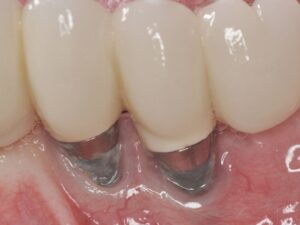Book a dental appointment
Complications of implantation
After surgery
Patients may feel pain and experience some swelling in the operation area after surgery. This will pass in a couple of days up to a week. If the pain and swelling are more extensive, occur some days after the surgery or are progressive in nature, it may indicate after-surgery inflammation of the implantation wound that in the worst-case scenario will be resolved by removing the implant. Such complications exist very rarely because of sterile instruments used during the surgery and preparation of the operation area.
Damage to nerves during surgery is a very rare complication that may cause later sensitivity malfunctions. Damage to blood vessels that may cause heavier bleeding and in very rare cases fatal haemorrhages is also possible but occurs in very rare cases. It is important to maintain sufficient distance between the sinus and the implant to avoid problems with the upper respiratory tract in future. To prevent such situations, it is important to gather as much information as possible about the location of these anatomic structures during the implant planning stage.

Complications of implantation
Early loss of an implant
An early loss of an implant (before loading a restoration) may be caused by an infection, a trauma to the bone surrounding the implant during surgery, too early loading or micro-movement during the ossification process. In such instances, it is usual that the implant becomes mobile already before loading and can often be easily removed. The implant should be removed and the patient has to wait healing of the bone and soft tissues in this area. The implantation procedure may be repeated in 6–8 weeks.
One of the most frequent long-term problems with implants is the inflammation of the soft tissue surrounding the implant – mucositis. This is caused by poor oral hygiene. The array of bacteria found around teeth that cause inflammation may colonise the surface of the implant. It is accompanied by inflammatory reaction, as evidenced by the appearance of redness, bleeding, pain or uncomfortable itching, swelling (same indicators that are around teeth in case of gingivitis). If this state remains without attention and treatment, it may escalate into peri-implantitis. In addition to inflammation, loss of bone around the implant screw is added to the problems. In the end, the situation may develop so far that the bone surrounding the implant is lost and the implant becomes mobile.
The first indication of inflammation affecting the soft tissue surrounding the implant may be slightly heavier bleeding of gums while brushing and flossing. Right after placing of the implant there may be some bleeding but if it appears months or years later, it is an indication of inflammatory changes. The patient may also experience local swelling, bad breath or taste and mobility of the implant, bridge or overdenture.
In order for these changes to be discovered and treated as early as possible, the patient has to visit a dentist or hygienist regularly. If you notice some of these changes, you have to visit a dentist as soon as possible.
Mucositis and peri-implantitis are treated by professional cleaning during which bacterial layers are removed from the surface of the implant. In addition, anti-bacterial mouthwash or gel may be used. In some cases, systemic antibiotics are indicated. As in case of gingivitis, inflammatory changes caused by mucositis are reversible with a timely and thorough treatment. If peri-implantitis is severe, sometimes a surgical solution must be used to clean the surface of the implant, or in the worst case, the implant has to be removed.
Read more:
- What is a dental implant
- The advantages of implants compared to conventional dentures
- Who is suitable for dental implants
- Examination of a patient and planning treatment
- Planning treatment
- Complications of implantation
- Caring for dental implants at home
Read more about our other dental treatment services here.
Read more about oral health here.
